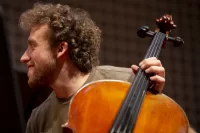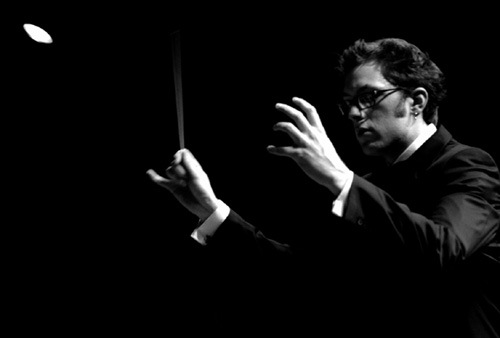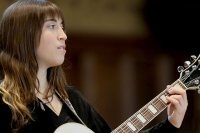
Bates College Orchestra offers world premiere of Ordway symphony
A conductor and prolific composer who has performed and taught across the U.S., Scott Ordway leads the Bates College Orchestra in the world premiere of his Symphony No. 3 at 7:30 p.m. Saturday, Nov. 9, in the Olin Arts Center Concert Hall, 75 Russell St.
The program also includes Beethoven’s Overture to Coriolanus and Wagner’s Siegfried Idyll. Admission is open to the public at no cost, but tickets are required, available at batesorchestra.eventbrite.com. For more information, please contact olinarts@bates.com or 207-786-6163.
Ordway, visiting assistant professor of music at Bates, started the symphony in Colorado in 2012 while he was a fellow at the Aspen Summer Music Festival, and continued it in Philadelphia and New York City. “The work reflects all three of those places, both the breadth and tranquility of the Rocky Mountains and the chaos and excitement of those two great cities.”
Stylistically, the work is “a hybrid of many different styles. Some passages are quite lyrical and romantic, and others are extremely chaotic, and I think most listeners would find them very modern.
“But I think they all contribute to a clear sense of structure.” Ordway says the piece consists of a single, 25-minute movement.
The piece is scored for strings, brass, tympani, harp and woodwinds. The orchestra will number about 35 and will incorporate Bates students, community members and two professional musicians.
Among the brass players are Kirk Read, a professor of French and francophone studies, who plays tuba, and politics professor James Richter, a trombonist. “They’re both really excellent brass players,” Ordway says.
The symphony is technically challenging for the players, and is also challenging for younger musicians with less experience of tracking the overall development of a longer piece. “It requires a long-term focus and understanding of how each section fits into a larger whole.”
“But the students have really risen to the challenge, and it’s been a tremendous experience for everyone involved.”
Ordway structured the program with a continuum of moods in mind. The opener is the Beethoven overture, one of that composer’s lesser-heard works, which is “heavy and high-energy.” The Wagner, while varied, tends to be calmer, more lyrical.
And Ordway’s symphony, which constitutes the second half of the program, starts out tranquilly and builds from there.
Ordway notes that he is teaching a course this term on the history of the symphonic form and will invite his students in that course “to attend the premiere and hear the new work in the context of the last two centuries of symphonic music that they’ve studied.”
The orchestra of the Curtis Institute, in Philadelphia, where Ordway studied conducting, will record the symphony in December.
Ordway has also composed two full settings of the Mass, and numerous chamber, solo and choral works, many of which have been performed, recorded and broadcast by top ensembles throughout the United States and in Europe.
As a conductor, he has held posts with New York’s Syzygy New Music Ensemble and the Eugene (Oregon) Contemporary Chamber Ensemble, and was in residence at the Boston Conservatory as associate conductor of the Juventas New Music Ensemble. In 2010-11 he was composer-in-residence and director of contemporary music at St. Maryís Episcopal Church in Philadelphia.
He earned his doctorate in 2013 from the University of Pennsylvania, and holds degrees from the University of Oregon and the University of Puget Sound.





